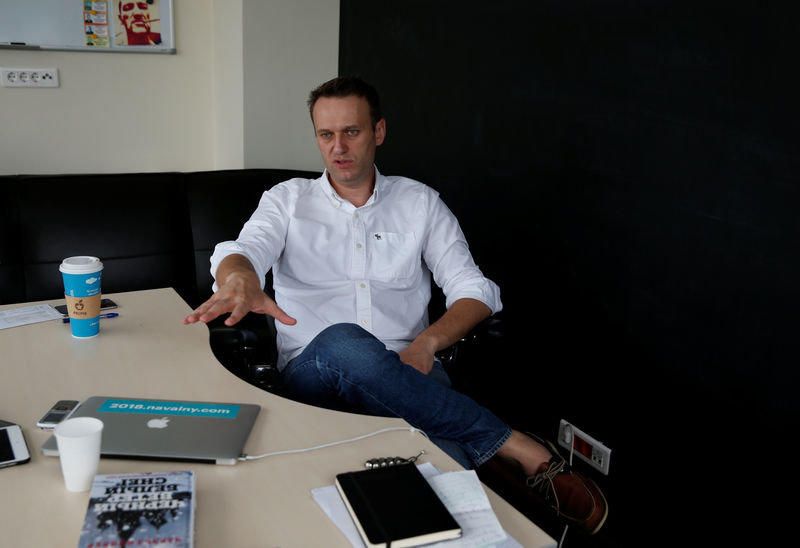By Svetlana Reiter and Andrew Osborn
MOSCOW (Reuters) - Russian opposition leader Alexei Navalny complains his wife and two children are being tracked by the security services, but says he's not afraid to challenge Vladimir Putin for the presidency whatever the risks.
Navalny, a 41-year-old lawyer who has organised the biggest anti-Kremlin protests in years, hopes to run against Putin in a presidential election in March and told Reuters he planned to call for more big anti-government demonstrations.
"My mood is generally really positive," said Navalny. "I have 125,000 volunteers, people turn out to demonstrate, they are detained, campaign literature is confiscated. (But) I see that people support us."
Putin, who has dominated Russia's political landscape for the last 17 years and remains highly popular according to opinion polls, has yet to confirm whether he will run for what would be a fourth term, but is widely expected to do so - and to win.
"I constantly hear that it's impossible to change anything and that there is this 86 percent (which supports Putin). But I don't see this 86 percent," Navalny said in an interview in his office overlooking a grey Moscow suburb.
"In an authoritarian country, such a number is not relevant. There will be an election campaign, people will see an alternative, and this 86 percent will crumble."
Previous opposition contenders have struggled to get their message across in a tightly-controlled media landscape where state TV hews closely to the Kremlin line and either ignores or denigrates rivals. They faced a particular challenge in areas of the vast Russian Federation far from Moscow and St Petersburg.
Navalny, who has used the Internet to try to tap into public anger over official corruption, is battling to even be allowed to take part in the election after the Central Election Commission said a suspended conviction for embezzlement he describes as politically-motivated disqualified him.
He has been jailed twice in recent months for his role in organising anti-government protests, had a caustic liquid thrown in his eyes by an assailant, and investigators have raided his Moscow election headquarters. Police have also confiscated copies of his campaign newspaper and hundreds of his supporters have been detained at protests and election events.
"How many times can you be afraid?" quipped Navalny, whose sprawling offices inside a business centre buzz with young people working on laptops, as well as allies broadcasting from a small studio to his online TV channel.
"The Kremlin's strategy is to prevent our activities. That's because the only reason for Putin's support is because nobody else is carrying out any other (political) activity."
His investigations into the high-rolling lifestyles of top government officials have riled the authorities and Navalny says his own family is now under constant pressure.
Navalny has a 9-year-old boy and a 15-year-old daughter.
"The security services are following us," said Navalny. "They follow my children, my wife and me. Cars are constantly passing by. I don't even pay attention to it any more, but Yulia (his wife) is really bothered by it."
Some opposition activists left the country after opposition politician Boris Nemtsov was shot dead near the Kremlin walls in 2015. Oil tycoon Mikhail Khodorkovsky was arrested on fraud charges in 2003, after expressing political ambitions, and imprisoned until 2013 when he was allowed to go abroad.
Since being temporarily blinded in one eye in the caustic liquid attack, Navalny sometimes appears with a bodyguard.
The FSB security service did not immediately respond to a request for comment.
CRITICS
Among Navalny's pledges: To depoliticise the judiciary, to champion a free media, to promote free market economics, to legalise personal handguns and to introduce a visa regime for visitors from Central Asia and the South Caucasus.
He told Reuters he would be willing to organise "an honest referendum" in Crimea which Russia annexed from Ukraine in 2014 to see which country its residents wanted to be part of. The way Moscow had seized it, he said, was illegal.
But he also said he thought the Crimea problem, which has soured relations with the West and triggered sanctions against the Kremlin, looked "intractable" and could poison relations for years ahead.
Critics have accused him of harbouring dangerous nationalist tendencies with one fellow activist suggesting he was a Kremlin stooge designed to create the illusion of political competition.
Navalny says he has no time for such "ridiculous" conspiracy theories and that his immigration policies are in line with "normal" European practice.
Dressed casually in jeans and a white shirt, Navalny said he was certain the authorities would relent and allow him to run in next year's election.
"I have no doubt I will take part in the election and that we will achieve our goal," he said.
One opinion poll earlier this year put his support as low as 1 percent. Navalny, however, points to the Moscow mayoral election in 2013 when he came from a low base to place second with almost one third of the vote.
He said he was using 125,000 volunteers and 60 election offices across Russia in a campaign designed to force authorities to allow him to run.
If he were barred from the election, he said, the ballot could not be regarded as fair.
He said he would deploy an army of volunteers as poll observers to ensure the 2018 vote was fair.
Top officials right up to President Putin are careful never to mention Navalny's name in public, even when asked direct questions about him.
Putin, when asked at the G20 in Hamburg earlier this month why he refused to pronounce Navalny's name publicly, said he wasn't interested in a dialogue with people out to promote themselves and again didn't mention Navalny by name.

"I understand the rules of the political games pretty well and what they (the Kremlin) do and what I must do," Navalny said. "We are conducting a real campaign which nobody else is doing. We are changing the political landscape."